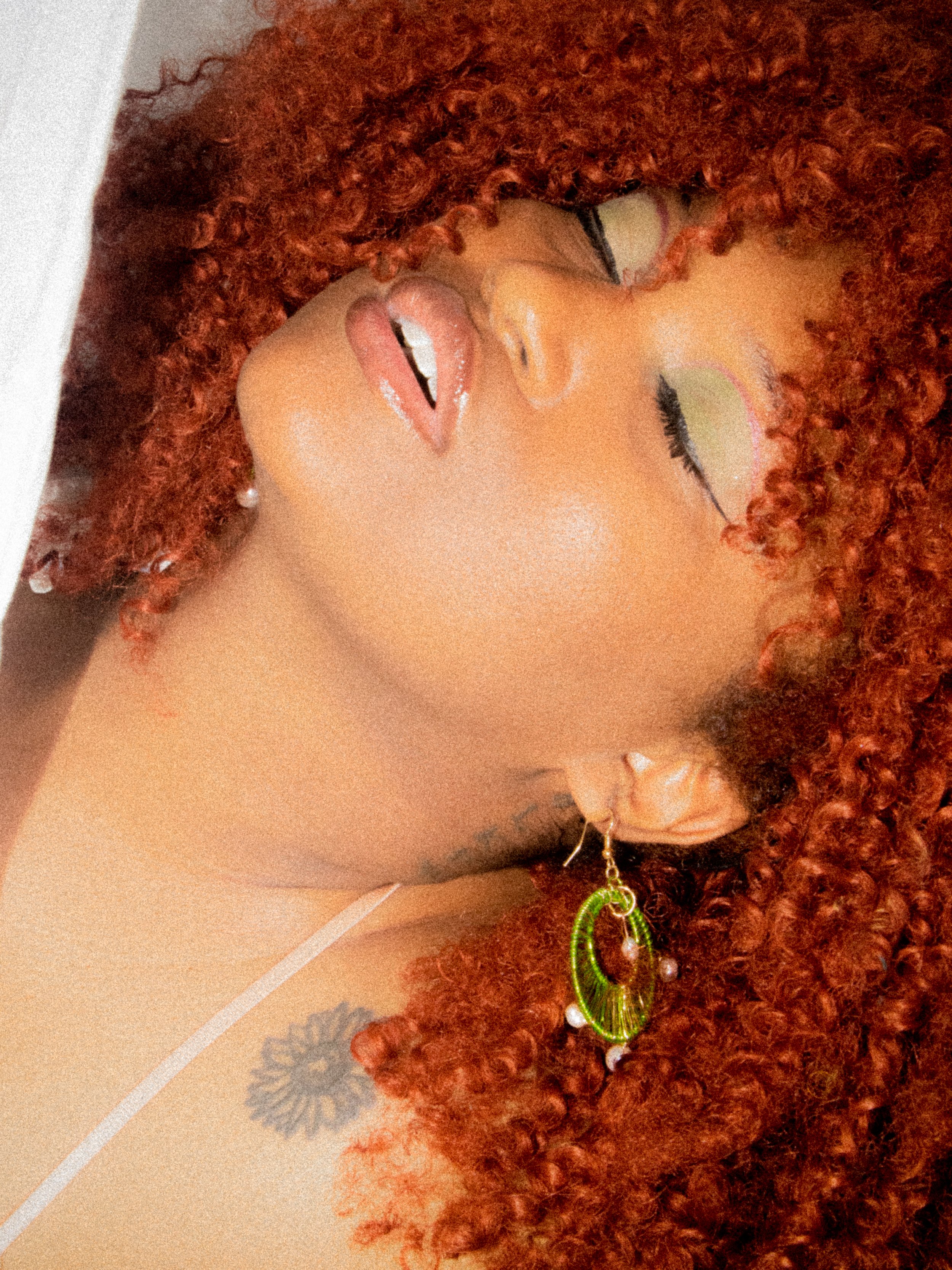MUSICIANS TO KNOW: JORDAN OCCASIONALLY
Jordan Occasionally
Jordan Occasionally is a non-binary singer-songwriter, content creator, and activist from Memphis, Tennessee. Having become a major contributor to the resurgence of disco-soul, their music has over 960k streams across Spotify as an independent artist and over 5.9 million likes on TikTok. Along with their performance accomplishments, Jordan is also a member of the 2023 Artist Advisory Council for Music Export.
BY TIARA STARKS
SHEER: Who is Jordan Occasionally? Where do you hail from and what did your childhood look like?
JORDAN OCCASIONALLY: I am a non-binary bad bitch straight out of Memphis, Tennessee! I was raised by a single dad, and I originally grew up in the church. When I was in high school, I joined an all women’s a cappella group, where I fell in love with music! I graduated with my Bachelors Degree in Music Business in 2021 and I’ve just been making music ever since I was 16 years old. Shoutout to GarageBand and SoundCloud.
SHEER: What made you want to get into music? Was there a specific album, or artist that served as your entry into the music world?
JO: What made me want to get into music was actually my high school choir teacher Nakisha Williams, who now works as an actress in the Broadway musical, Hamilton. It was really her telling me that I didn’t have to settle, I could just make my dreams come true if I believed in myself. From that point on, I really did take music seriously.
SHEER: Did you have other goals aside from music growing up?
JO: I was grateful to have a dad who sacrificed a lot for himself to make sure that music could be my priority. Once I tapped into this idea that I can make my own music, it was my only dream in life.
SHEER: Looking back on your education, were there any defining moments that helped solidify your decision to become a music artist?
JO: I think working alongside other amazing queer women and feminists when I was just 15 years old and being able to ask questions about this world and have those questions be honored really helped me. I could ask, “Why do women get paid less in the music industry or in any field?”, “Why does race have to be a systemic barrier in peoples’ lives?”, “Why does gender separate so many people when we are all so multifaceted and valuable?”. It was a really defining moment being able to grow into my understanding of self, with a community of people that supported my questions. I grew up listening to music that wasn’t by queer artists and I knew that I wanted to become one. Through my music, I wanted to tell a story that hadn’t been heard before.
In 2021, Jordan was awarded the “Communicator of the Year Award” for protests they lead on behalf of Black women and Black trans lives in the US. It comes as no surprise as the multi-hyphenate has not only expanded their influence in activism only through social media but their music as well.
SHEER: In addition, growing a following on TikTok as a music artist is almost a must these days, how do you balance social media promotion with staying authentic and true to yourself?
JO: I find the social media bit to be the fun part of it all. To be honest, like when you’re not thinking about how many likes you’re gonna get on a video and if every single TikTok you make is going to blow up, you just kind of treat social media like fun. You treat it like a virtual online community that’s really rooting for you. Social media doesn’t really see the full picture of what’s going on behind the scenes. They just see the results. So I try to keep it fun and educational and I keep everything else in my therapy sessions lol.
SHEER: The song “Lie, Lie, Lie” is one of your most popular tracks to date. What was the inspiration behind crafting that song?
JO: The inspiration behind my song ‘’Lie, Lie, Lie’’ was really situationships mane!!! Dating in your 20s is ghetto and a lot of people think, “Well, since you’re queer is dating women easier than dating men?” No! That’s the easy answer!
SHEER: You consider yourself an artist who is “changing, evolving, growing as a plant does.” Do you ever feel pressure to define your artistry in rigid terms?
JO: After I started to gain so much visibility with ‘’Lie, Lie, Lie’’, I used to feel pressure to live up to this standard of always having the trending song, but now I’m more carefree about the music that I create and I’m intentional. I don’t want to release music just to release music. I want to release songs that create a cultural impact and that’s why I take my time with things. Every single record I’ve released has been attached to my identity as a black queer non-binary person and it will always be that way. I need to keep experiencing life so that my music can reflect the experiences that I’m having. Being a songwriter, I have to meditate on my experiences no matter how uncomfortable they feel. Instead of focusing on the noise of social media, streaming numbers, and “stans”, I have to focus on what makes me happy.
“I could ask, ‘why do women get paid less in the music industry or in any field?’, ‘Why does race have to be a systemic barrier in peoples’ lives?’, ‘Why does gender separate so many people when we are all so multifaceted and valuable?’. It was a really defining moment being able to grow into my understanding of self, with a community of people that supported my questions.”
SHEER: You shared such an incredible performance on Genius. How did you feel about getting that opportunity and what was it like to be featured for one of their open mics?
JO: Honestly, it was surreal. I feel like I am still a little bit insecure about myself so when I got that opportunity I started to question if I deserved such a major turning point in my career. But then I got on the Genius stage and I just had fun and I ended up singing that song in like three takes. I felt like a boss because the people that work there were like “It usually takes an artist 20 takes” so that says a lot.
SHEER: As a queer artist, what are some of your hopes/any advice for continued inclusion in the music industry, specifically for queer black artists?
JO: I get so excited to see more queer black artists take up space and cause so much conversation in the music industry because we are the New Vanguard for our ancestors that couldn’t share these parts of themselves because they would be blackballed. So we’re literally standing on the shoulders of giants. Being able to talk about queer love and romantic intimacy, not only in our music, but in our interviews, we are truly walking history and so all that I can say is that I am so proud to be here.
We don’t really need an award show to tell us that we matter. The movement never really ends when you make good music, because good music lasts forever. We’re shifting culture just by being here and the music industry will become easier for artists like us because of us and what we go through.
“every single record I’ve released has been attached to my identity as a black queer non-binary person, and it will always be that way. I need to keep experiencing life so that my music can reflect the experiences that I’m having.”
SHEER: Do you have any plans to tour soon? What does the future of Jordan Occasionally look like?
JO: The future of Jordan Occasionally is bright. Currently, I am collaborating with artists all over the world that inspire me so expect more dance pop anthems. I definitely see myself headlining a tour for someone. My manifestations and delusions got me this far.















Photography by Avery Savage
To close out The Shed’s Open Call: Portals series, we’re spotlighting Chelsea Odufu, a multidisciplinary artist whose work spans film, photography, sculpture, performance, and design. Her installation Gold with a Mind of Its Own explores the lasting imprint of the gold trade in Côte d’Ivoire through movement and visual language, using the body as a tool for reflection and resistance.
Now living between Abidjan and New York, Chelsea brings a global perspective to everything she creates, shaped by movement across mediums, across continents, and across dimensions of Black identity.